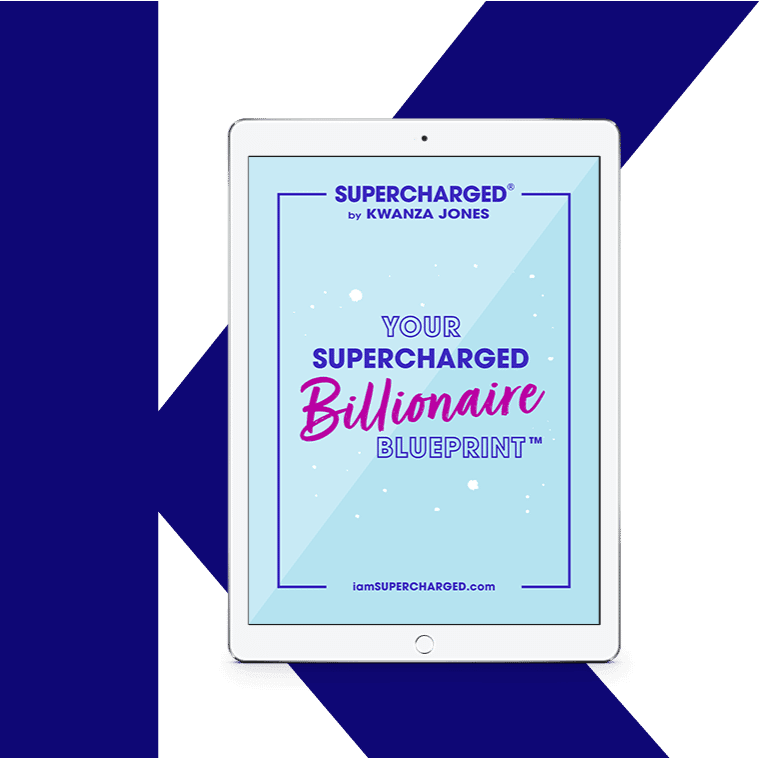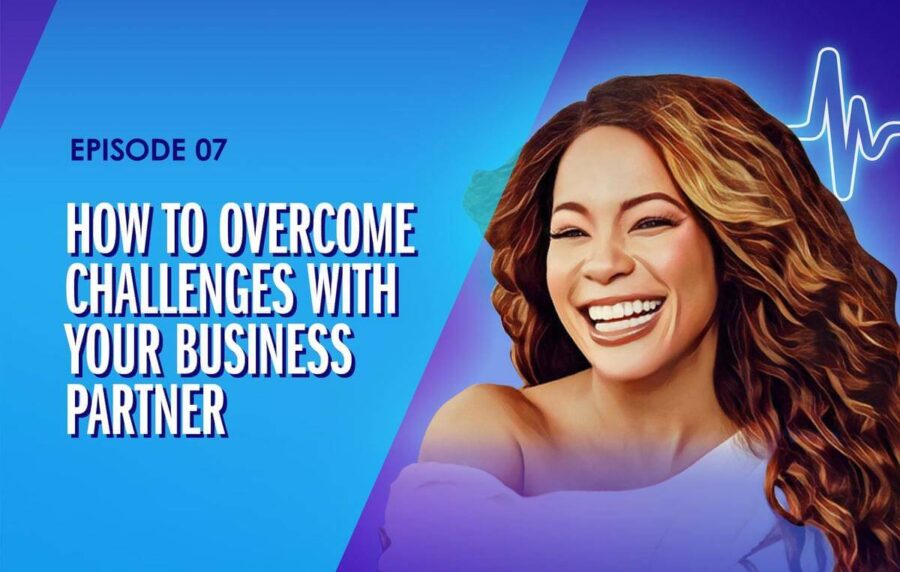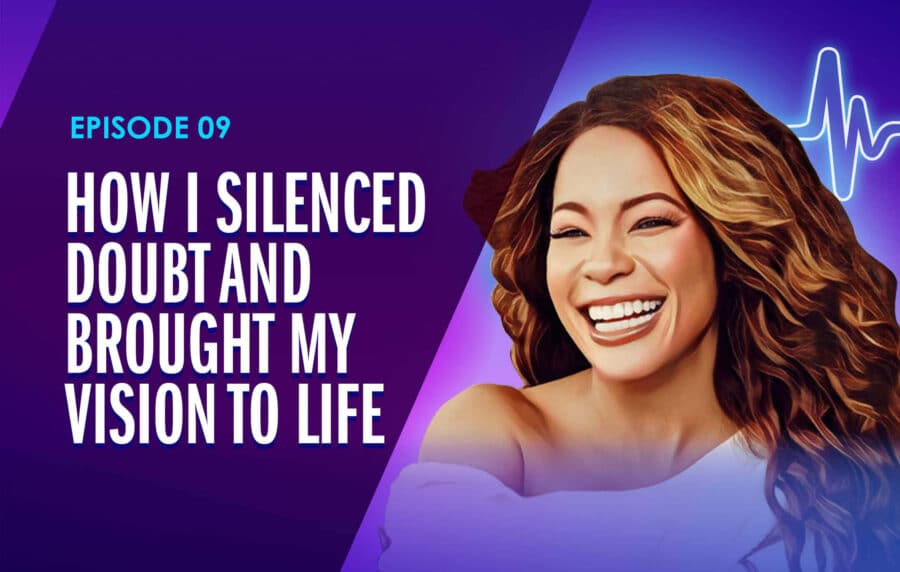EPISODE 08 | I AM SUPERCHARGED Podcast
How To Take Action and Turn Your Dreams Into Reality
Billion dollar ideas and making money moves
ABOUT THIS EPISODE
You have to take action if you want to move from where you are to where you want to be. In this episode, we discuss what it takes to become successful in areas where it seems challenging or impossible. Join me as I chat with CEO and Founder of Thesis Couture, Dolly Singh and venture partner, Carmen Palafox of MiLA Venture Group.
Tune in and listen to Carmen Palafox and Dolly Singh talk about how they make power moves in areas where women are rarely seen and overcome the challenges that come with being different. Here are some notes and links from the show:
- Meet Carmen Palafox of MiLA Capital
- Check out MiLA Capital, a venture capital firm
- Learn more about Dolly Singh, Founder of Thesis Couture
- Check out Thesis Couture, a fashion tech brand.
- Connect with me on Instagram @kwanzajones
- Check out my website Kwanza Jones
Kwanza Jones 00:00
So let me tell you about this wonderful, wonderful, beautiful and intelligent woman. This is a woman who is in the world of finance and venture capital, that in and of itself is a rarity, as we all know, okay. You might not know. But now you do know, she has to play with the big boys, I'll say it that way. So she's got a lot of different insight that she'll be giving us. Actually, you'll hear a little bit more about her and her relationship because remember, it's power partnerships, her relationship with the next woman who is coming out, and we've got Dolly Singh, come on up.
Hey. All right. Dolly, Carmen power moves for a more powerful you. So here's what I'm gonna do because you know your fashion. So there's no way you could be in fashion and not have the tape on your mic not showing. Here, It's not you. It's perfect. See, you're like see, okay, why did I have to do that whole thing, because Dolly is in fashion. But beyond fashion, Dolly is in tech. And she's going to tell you all about her tech enabled fashion footwear line called Thesis Couture. Now, Dolly oh, she's worked with the likes of Elon Musk and such. And you know, she'll tell you all about that. Dolly, Carmen, we're ready to talk about power moves for more powerful you. And we're starting right here right now with all of us. So please, come on let's take a seat. Before we move on to even your relationship with Carmen and how you all met, and funding and all those other good things, tell them about the heels, tell them about the product.
Dolly Singh 01:33
Absolutely. So Thesis Couture is a fashion tech brand. And basically what we're trying to do is combine engineering, and fashion as it relates to footwear for women. So when you're wearing high heels, you know, your body's doing all the work because you're basically just being propped up on your toes. So you're, all of your body weight is pitch loaded on the balls of your feet. Your heel bone is a big strong bone, it was designed to carry your body weight. Your toe bones are like the size of the tip of your pinky. So they didn't sign up for that job, right? So putting high heels on is really kind of like the opposite of what we are anatomically designed to do. So the next step was okay, if there's a design, opportunity for improvement, why hasn't somebody else already done this? Because there were clearly lots of people in the footwear industry that were making lots of money.
But when you look at the industry, you find that design houses all of the companies that you guys think make shoes, Gucci, Prada, Dior, Jimmy Choo, Steve Madden, Nine West, right, none of them actually make shoes, they make sketches of shoes, those sketches go to a factory and the factory makes this product and sends it back to the design house, they iterate. And then that's how the products are eventually branded and come to market. But what's missing in that equation, right. You have artists, which are designers, and you have craftsmen, right people on the factory floor, there's a $40 billion ecosystem with no engineers. That seems insane in you know, 2018. So that's kind of how it all started, cos I felt like, all I had to do is interject some engineering and maybe something good would happen. And because I built a strong network in engineering, I felt like I was uniquely equipped to, you know, bring a level of talent to the problem that normally wouldn't look at the problem, because let's say you were Nike, which is like the world's leading footwear company. If you called Gareth and Hans and said, hey, we need your help making the shoe, they probably would have been like, well, we're kind of busy making rockets and trying to go to Mars, so can't help you. But because I had a personal relationship with them, they were willing to, they were willing to do things that they might not have done. So that was kind of how it all started.
Kwanza Jones 03:36
So then, Carmen, tell us about your relationship to Dolly and how you found her, how you all interacted, engaged, and then even funding and things of that sort.
Carmen Palafox 03:46
So I'm a venture capitalist and I'm out there looking for billion dollar opportunities. I went to a Harvard entrepreneurship event and in the corner was a pop up for Thesis Couture. I'd gotten to this event on the metro, I was wearing my flip flops and as soon as I got a block away from the event I put on my shoes.
Kwanza Jones 04:16
We all understand, okay. I know most of us understand that.
Carmen Palafox 04:21
So I did that, because my shoes were beautiful, but incredibly uncomfortable. And so when I went into the event I made my rounds, networking and I saw Thesis Couture and I was really curious about what they the promise was, you know, comfortable stilettos, no way I thought in my mind. So I put them on and I was in love. I am I'm a runner and so I always tell Dolly that you know I care a lot about you know being comfortable, which is why I wear my flip flops places and then put the uncomfortable shoes on at the minute I need to. So I tried the shoes on, was totally convinced and sold on the the comfort and the transformation, and started hunting Dolly down. So I reached out to her on LinkedIn, and was like, I want a conversation with you. We spoke, I was incredibly impressed by her vision and her strategy. What she's trying to do is transform an industry not an incremental change, but a complete transformation. And to me that represents a billion dollar opportunity.
Kwanza Jones 05:42
So what was it about venture capital specifically, that drew you to it?
Carmen Palafox 05:48
What drew me to it was the power to create wealth. I am a big believer that if there is going to be change in my community in the Latin X community, then folks in my community need to build wealth, and they need to get power. And venture capital is an awesome way to do that. You know, I always tell the Snap story because there was there's a church in Palo Alto that put $15,000 into Snap, and ended up making $24 million. That's just one example of the potential of venture capital and startup investing.
Kwanza Jones 06:34
So what is a move you made, that you did not know at the time was going to be a power move, but turned into a power move?
Carmen Palafox 06:44
Go ahead
Dolly Singh 06:45
So when I joined SpaceX, I had left I was shutting down my book of business. So I spent six years building an executive search firm, it was a small operation, it was a nice lifestyle business. I had three kids, worked from home. So it was, you know, kind of a cushy situation. And similar to Carmen, I was pretty comfortable. I could have done that literally for the next 25 years and would have been fine. But I was like, kind of hungry for something that made me uncomfortable, right. When that made me not sure I could do it. And so when I interviewed at SpaceX, I was offered a start-up salary and equity. And at the time, I didn't even know what equity was, right. So I'm looking at my current compensation, which is here, and then my offer, which was here and I'm like, this makes no sense. But I was so enamored what they were doing, Elon explained to me how equity works. And that, yes, it's a gamble. But if we end up on the right side of this thing, you're going to end up 20x ahead of where you thought you were gonna be right. And so I said, Okay, let's jump. So, you know, we were when I joined, we were like six weeks away from running out of capital. We had just blown up our second rocket.
Kwanza Jones 07:54
Literally.
Dolly Singh 07:54
Literally, so like our hardware was falling out of the sky, we're running out of money. The story in the LA Times. It's not the Elon Musk people think of today right, at the time, they were comparing him to Jim Jones.
Kwanza Jones 08:07
Right.
Dolly Singh 08:08
And everybody that was working for him was like committing career suicide by drinking the Kool-Aid, right? So it was like, all the logical signs said this is insane. But it was something that was moving and exciting and scary. And so I was like, let's give it a whirl. And it turned out to be one of the smartest, probably the smartest thing that I've ever done.
Kwanza Jones 08:30
Well, this is a perfect time to open up the floor to questions.
Unknown person: 08:36
Hi, um, I was wondering if, just because I work, I've always worked with people who don't look like me. I'm usually like, the only person that looks like me. I'm only girl, I'm only black person. And I'm only I'm usually like alone in that. And I was wondering if your support systems are like the people you confer with or talk with look like you? Or if they look like, I mean, everyone's coming at you, like the idea of like your boss, like, like, someone who doesn't look like you. And if you think it would be more beneficial to have people who look like you and identify with, you know, who you are, and around you, giving you advice and how to move forward because I always wanted to have someone to mentor me who looks like me. So I feel like I always benefit more from that. So what are your support groups look like? And do you think that you would get more out of it if they did look like you?
Carmen Palafox 09:24
So I was at Dimensional for 15 years before they decided to move headquarters. And I did look around and I said whoa, I need to really get into networking because I'm not going to move and I need to figure out what my next job is. And I did reflect on my network there. I didn't have any professional, Latino, Latina friends at all and so I joined an organization called the Alpha and that organization is national organization and it supports Latin X folks in finance and leadership. And it was extremely helpful because it was a safe zone for me. I didn't have experience talking in public, I didn't have experience selling to corporates. And through this organization, I took on leadership positions, I became the chapter president of that LA chapter. And I was given that ability to speak on stage to 1000s of people to, to sell sponsorships to, you know, Coca Cola and Target. And so, yeah, I think it's definitely a benefit to surround yourself with peers. In venture capital now, I'm a part of women and venture groups. I started a poker night because I would go to events and all the male VC's would talk about how fun it was to, you know, play poker together. They would talk about the night before and how cool it was. And I thought to myself, Oh, my God, I want to play. And I didn't have that network of friends. So I started out a women in tech poker night, and I got it sponsored. And I do it a few times a year, and it's amazing.
Dolly Singh 11:24
I lose my money consistently.
Carmen Palafox 11:27
To charity.
Dolly Singh 11:29
For a good cause.
Carmen Palafox 11:31
Yes.
Dolly Singh 11:31
I had beginner's luck, like the first time and then ever since then, I've been getting cream. But I mean, my two cents is I think you have to do both, right. Like, there are things where I can talk to Carmen about it, because she is a brown woman will be, and a brown woman who’s facing fundraising can relate in a way that somebody else can't. But if I didn't have like, Caucasian male friends that are like, you know, came from wealth I didn't come from I'm a first generation immigrant, right? Like, my family didn't come here with money. So I never really knew wealthy people. But you know, when I was growing up, but if I hadn't had the comfort during my professional career, to reach out to some of them, like, then I wouldn't have as robust a network as I have now. So you don't want everybody in your network to look like you. You actually want as many people that are as different from you as possible. But you definitely want some people that can understand where you're coming from, especially as an entrepreneur or business owner, nobody understands it, unless they've done it. So if you are an entrepreneur, you need other entrepreneurs in your support system. Otherwise, like your mental health will definitely suffer, right? So I have a strong family, I have a great husband, I'm able to like, you know, like, let off whatever steam. If I need to cry, I have somebody to cry to right. So you need that. But don't limit yourself to just what you're comfortable with, right?
Carmen Palafox 12:50
That was a great question by the way
Kwanza Jones 12:54
Anyone else?
Unknown person 12:55
Hi. So Carmen had mentioned that you have a certain strategy before you walk into a meeting, to bypass the idea of what you actually look like. And, you know, people have a certain perception of you, by the way you look, I'm in fitness, they look at me, they think I might want to kick someone's butt. And that's not me. So I both of you, I'm sure have similar strategies or different strategies as, what tactics do you use, and what type of strategies do you use before you walk into that meeting, so people who talk to you know, what you're really truly about, not what just you look like?
Dolly Singh 13:38
I mean, I've never I'm kind of a loud mouth. So I really don't overanalyze, right. So, I did find, though, that in tech, even though it was male dominated, like, I use my voice as a woman, you know, very assertively, and I was able to sometimes have conversations and use my empathy or some of my communication skills in a way that my male colleagues might not be able to. So I always used what somebody might consider a weakness to my own advantage to whatever extent I could, right. It is, you know, genuinely much more difficult, like statistically 3% of venture capital goes to women. So you can't avoid it, I guess, right. But I think the best you can do is have an understanding of your audience, right? So any meeting the homework that I usually do and like, the best, you know, takeaway is, I like really, really obsessively stalk the person that I'm meeting with so I can understand what motivates them, what's their trigger, right? Because if I understand where their levers are, then I can position my pitch in a way that it's gonna, like, impact them, right, because you could make one pitch to one person one way and it doesn't matter, but if it's the same product, but you kind of hit a nerve to something that matters to them, then they might listen to it right. So the best thing that I try to do is, be specific in my intentions before meetings. So know what it is that I want coming out of the meeting and research the person that I'm meeting with to the greatest extent possible. So I can figure out where I can find a win-win for them and me. Similar to what Carmen was saying earlier, like, what do I have to offer, right? So those are probably my best pre meeting prep tricks.
Kwanza Jones 15:22
Any other questions? We have time for probably one more.
Unknown person 15:27
So for you as an entrepreneur, because I'm entrepreneur, was it worth it getting the investor? And for the investor part, was it worth it going into her business? And if so, how long is your contracts? And what is the percentage?
Dolly Singhh 15:44
Well, a lot of questions. For me, was it worth it? Absolutely, I wouldn't have gotten to the point where I did if it wasn't for my investors, they've all been tremendously kind and patient. So I'm super thankful for that. But because, you know, I was lucky enough that with the wrong people, it didn't work out, right. So the investors that we ended up getting, because it is like, the less likely deal, quite frankly, are people that genuinely either cared about me and believed in me or cared about the business. So I'm super thankful for all of the people that have invested in us. And, you know, I think terms of the deal always depends on any business for us, our first valuation, we raised on a $10 million valuation, which was really high for our startup, and was really hard for me to get people excited about. So I made the barrier more difficult than I needed to, quite frankly. But like I said, you know, you kind of you go and you learn. So I think, from my perspective, whatever percentage is less important than is that person going to add value, right? So Carmen, and another investor might have invested the same amount, but she adds a lot of value. So quite frankly, I wouldn't care how much you know, the percentage was for her per se, right? So I think the focus should be on finding people that you have a good relationship with. If you do then they're going to be as interested in you are as giving you a fair deal, right? Because it doesn't make any sense for the investor to try to like lowball you. If they actually care about your business. Investors that are trying to lowball you are probably not the best people to bring into your business. I don't know if that answers your question, but
Carmen Palafox 17:22
And, and for me, it is a power move. Because the fact of the matter is that we're just my partners and I are getting started. So we have a small fund, our checks, our investment sizes is small relative to other funds. So I really every time I speak to a entrepreneur, I have to say like here is how we can help you. Here's the resources we have. So it's definitely like I try and help our companies get to the next level. It's always asking like, what's your biggest challenge? How can I help you? And in doing so then I'm able to get into these investments. And I don't regret any of them so far.
Dolly Singh 18:09
The money should be like the least valuable thing your investor gives you in an ideal scenario, right? Because money you can get, theoretically from anybody, right? One person's check is as good as a different person check. But if that check comes with energy and intention and excitement, right. Carmen evangelizes for us, she goes places and tells people how awesome we are. That's much more valuable than the money alone. I'm here because she introduced me to Kwanza, right, so that's where the real value comes from. If they're passionate about what you're doing.
Kwanza Jones 18:42
The end. Everyone, give a round of applause to both Carmen and Dolly. Thank you both so much. This was wonderful.
[00:01] Introducing Carmen Palafox
[00:26] Introducing Dolly Singh
[01:33] Talking about Thesis Couture
[03:46] How Carmen met Dolly
[05:42] What drew you to venture capital?
[06:34] What is a move you made that turned into a power move?
[08:30] What are some characteristics in both of you, that make your family, your business partnerships and marriage so strong?
[09:17] What do your support groups look like? Do you think you would get more out of it if they look like you?
[13:25] What strategies do you use before walking into a meeting, so people talk to you based on what you're about, and not based on what you look like?
[15:27] As an entrepreneur, was it worth it getting the investor? And for the investor part, was it worth it going into her business?
WHAT YOU'LL LEARN
- How to make Power Moves that will be relevant tomorrow
- Why you should surround yourself with people of diverse background
- What it takes to become successful in areas where it seems challenging or impossible
Ask
A QUESTION
Got Q's? I've got answers. Leave me a voice note to get it answered in an upcoming episode.
Music Release
SUPERCHARGED
I am SUPERCHARGED. And You are too! Don't doubt it, just believe it. You are strong enough, smart enough, bold enough.
Need a boost to get you through your goals? Get SUPERCHARGED!

MORE EPISODES
Kwanza Jones hosts the inaugural SUPERCHARGED Summit with a special fireside chat with power couple Cookie Johnson and Earvin “Magic” Johnson.
LEARN MOREKwanza Jones recaps on hosting the inaugural SUPERCHARGED Summit. If you missed the SUPERCHARGED Summit, you missed out. Guest panelists.
LEARN MORE
Freebie
Download My
Blueprint
Billionaire blueprint
Do you set goals and never look at them again? The trick to hitting every goal is to revisit it constantly. Every year, I spend focused time with José, my partner in business and life, to map out our goals and plan for a successful year ahead. I do the same thing with my team.
And now, I'm giving you this life-boosting blueprint…for FREE!





